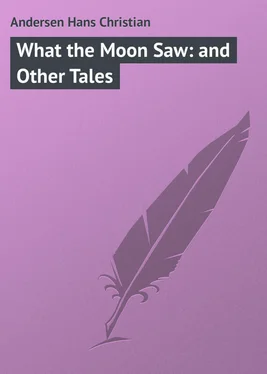Andersen Hans - What the Moon Saw - and Other Tales
Здесь есть возможность читать онлайн «Andersen Hans - What the Moon Saw - and Other Tales» — ознакомительный отрывок электронной книги совершенно бесплатно, а после прочтения отрывка купить полную версию. В некоторых случаях можно слушать аудио, скачать через торрент в формате fb2 и присутствует краткое содержание. Жанр: foreign_prose, на английском языке. Описание произведения, (предисловие) а так же отзывы посетителей доступны на портале библиотеки ЛибКат.
- Название:What the Moon Saw: and Other Tales
- Автор:
- Жанр:
- Год:неизвестен
- ISBN:нет данных
- Рейтинг книги:5 / 5. Голосов: 1
-
Избранное:Добавить в избранное
- Отзывы:
-
Ваша оценка:
- 100
- 1
- 2
- 3
- 4
- 5
What the Moon Saw: and Other Tales: краткое содержание, описание и аннотация
Предлагаем к чтению аннотацию, описание, краткое содержание или предисловие (зависит от того, что написал сам автор книги «What the Moon Saw: and Other Tales»). Если вы не нашли необходимую информацию о книге — напишите в комментариях, мы постараемся отыскать её.
What the Moon Saw: and Other Tales — читать онлайн ознакомительный отрывок
Ниже представлен текст книги, разбитый по страницам. Система сохранения места последней прочитанной страницы, позволяет с удобством читать онлайн бесплатно книгу «What the Moon Saw: and Other Tales», без необходимости каждый раз заново искать на чём Вы остановились. Поставьте закладку, и сможете в любой момент перейти на страницу, на которой закончили чтение.
Интервал:
Закладка:
All things here corresponded with each other. The motto was still "Everything in its right place;" and therefore all the pictures which had been put up in the old house for honour and glory, hung now in the passage that led to the servants' hall: they were considered as old lumber, and especially two old portraits, one representing a man in a pink coat and powdered wig, the other a lady with powdered hair and holding a rose in her hand, and each surrounded with a wreath of willow leaves. These two pictures were pierced with many holes, because the little barons were in the habit of setting up the old people as a mark for their cross-bows. The pictures represented the Councillor of Justice and his lady, the founders of the present family.
"But they did not properly belong to our family," said one of the little barons. "He was a dealer, and she had kept the geese. They were not like papa and mamma."
The pictures were pronounced to be worthless; and as the motto was "Everything in its right place," the great-grandmother and great-grandfather had been sent into the passage that led to the servants' hall.
The son of the neighbouring clergyman was tutor in the great house. One day he was out walking with his pupils, the little barons and their eldest sister, who had just been confirmed; they came along the field-path, past the old willow, and as they walked on the young lady bound a wreath of field flowers, "Everything in its right place," and the flowers formed a pretty whole. At the same time she heard every word that was spoken, and she liked to hear the clergyman's son talk of the power of nature and of the great men and women in history. She had a good hearty disposition, with true nobility of thought and soul, and a heart full of love for all that God hath created.
The party came to a halt at the old willow tree. The youngest baron insisted on having such a flute cut for him from it as he had had made of other willows. Accordingly the tutor broke off a branch.
"Oh, don't do that!" cried the young baroness; but it was done already. "That is our famous old tree," she continued, "and I love it dearly. They laugh at me at home for this, but I don't mind. There is a story attached to this tree."
And she told what we all know about the tree, about the old mansion, the pedlar and the goose-girl, who had met for the first time in this spot, and had afterwards become the founders of the noble family to which the young barons belonged.
"They would not be ennobled, the good old folks!" she said. "They kept to the motto 'Everything in its right place;' and accordingly they thought it would be out of place for them to purchase a title with money. My grandfather, the first baron, was their son: he is said to have been a very learned man, very popular with princes and princesses, and a frequent guest at the court festivals. The others at home love him best; but, I don't know how, there seems to me something about that first pair that draws my heart towards them. How comfortable, how patriarchal it must have been in the old house, where the mistress sat at the spinning-wheel among her maids, and the old master read aloud from the Bible!"
"They were charming, sensible people," said the clergyman's son; and with this the conversation naturally fell upon nobles and citizens. The young man scarcely seemed to belong to the citizen class, so well did he speak concerning the purpose and meaning of nobility. He said,
"It is a great thing to belong to a family that has distinguished itself, and thus to have, as it were, in one's blood, a spur that urges one on to make progress in all that is good. It is delightful to have a name that serves as a card of admission into the highest circles. Nobility means that which is great and noble: it is a coin that has received a stamp to indicate what it is worth. It is the fallacy of the time, and many poets have frequently maintained this fallacy, that nobility of birth is accompanied by foolishness, and that the lower you go among the poor, the more does everything around shine. But that is not my view, for I consider it entirely false. In the higher classes many beautiful and kindly traits are found. My mother told me one of this kind, and I could tell you many others.
"My mother was on a visit to a great family in town. My grandmother, I think, had been housekeeper to the count's mother. The great nobleman and my mother were alone in the room, when the former noticed that an old woman came limping on crutches into the courtyard. Indeed, she was accustomed to come every Sunday, and carry away a gift with her. 'Ah, there is the poor old lady,' said the nobleman: 'walking is a great toil to her;' and before my mother understood what he meant, he had gone out of the room and run down the stairs, to save the old woman the toilsome walk, by carrying to her the gift she had come to receive.
"Now, that was only a small circumstance, but, like the widow's two mites in the Scripture, it has a sound that finds an echo in the depths of the heart in human nature; and these are the things the poet should show and point out; especially in these times should he sing of it, for that does good, and pacifies and unites men. But where a bit of mortality, because it has a genealogical tree and a coat of arms, rears up like an Arabian horse, and prances in the street, and says in the room, 'People out of the street have been here,' when a commoner has been – that is nobility in decay, and become a mere mask – a mask of the kind that Thespis created; and people are glad when such an one is turned into satire."
This was the speech of the clergyman's son. It was certainly rather long, but then the flute was being finished while he made it.
At the castle there was a great company. Many guests came from the neighbourhood and from the capital. Many ladies, some tastefully, and others tastelessly dressed, were there, and the great hall was quite full of people. The clergymen from the neighbourhood stood respectfully congregated in a corner, which made it look almost as if there were to be a burial there. But it was not so, for this was a party of pleasure, only that the pleasure had not yet begun.
A great concert was to be performed, and consequently the little baron had brought in his willow flute; but he could not get a note out of it, nor could his papa, and therefore the flute was worth nothing. There was instrumental music and song, both of the kind that delight the performers most – quite charming!
"You are a performer?" said a cavalier – his father's son and nothing else – to the tutor. "You play the flute and make it too – that's genius. That should command, and should have the place of honour!"
"No indeed," replied the young man, "I only advance with the times, as every one is obliged to do."
"Oh, you will enchant us with the little instrument, will you not?" And with these words he handed to the clergyman's son the flute cut from the willow tree by the pool, and announced aloud that the tutor was about to perform a solo on that instrument.
Now, they only wanted to make fun of him, that was easily seen; and therefore the tutor would not play, though indeed he could do so very well; but they crowded round him and importuned him so strongly, that at last he took the flute and put it to his lips.
That was a wonderful flute! A sound, as sustained as that which is emitted by the whistle of a steam engine, and much stronger, echoed far over courtyard, garden, and wood, miles away into the country; and simultaneously with the tone came a rushing wind that roared, "Everything in its right place!" And papa flew as if carried by the wind straight out of the hall and into the shepherd's cot; and the shepherd flew, not into the hall, for there he could not come – no, but into the room of the servants, among the smart lacqueys who strutted about there in silk stockings; and the proud servants were struck motionless with horror at the thought that such a personage dared to sit down to table with them.
Читать дальшеИнтервал:
Закладка:
Похожие книги на «What the Moon Saw: and Other Tales»
Представляем Вашему вниманию похожие книги на «What the Moon Saw: and Other Tales» списком для выбора. Мы отобрали схожую по названию и смыслу литературу в надежде предоставить читателям больше вариантов отыскать новые, интересные, ещё непрочитанные произведения.
Обсуждение, отзывы о книге «What the Moon Saw: and Other Tales» и просто собственные мнения читателей. Оставьте ваши комментарии, напишите, что Вы думаете о произведении, его смысле или главных героях. Укажите что конкретно понравилось, а что нет, и почему Вы так считаете.












